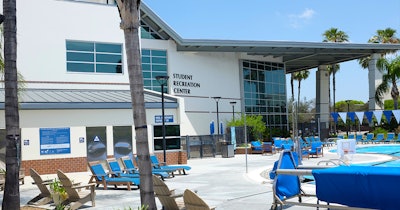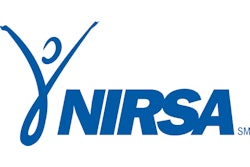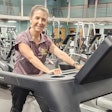
In the fall of 2020, the University of California at Los Angeles implemented the Bruin Public Health Ambassadors program in response to the COVID-19 pandemic. The program, co-managed by UCLA Recreation and the Student Health Education and Promotion (SHEP), was made up of student ambassadors who were charged with reminding other students to maintain social distancing, wear masks appropriately, and ensure that students were not violating any of UCLA’s COVID-19-related policies.
The UCLA initiative was considered a success and shines some insight on a question that many colleges and universities have been grappling with since before the coronavirus pandemic started: how do recreation departments view their roles when it comes to contributing to public health?
It’s a question that was on the minds of Erinn McMahan, Executive Director of UCLA Recreation and Tiffani Garnett, Associate Director of Student Health Education and Promotion (SHEP) in the summer and fall of 2020, as the campus community weighed many options for how to respond to the pandemic and how to create safer conditions as students and staff returned to campus. Both Erinn and Tiffani saw an opportunity to team up and advance a growing trend of student health and campus recreation departments working collaboratively.
One outcome of the collaborative initiative could be seen in how the program was staffed; most of the Bruin Public Health Ambassadors consisted of student staff members for the recreation department. Additionally, UCLA’s recreation facilities were utilized as “testing centers or to deliver other COVID-related resources,” says Erinn.
These types of efforts weren’t isolated to UCLA, however; regionally, both Erinn and Tiffani noticed a few recreation departments in and around the West Coast were taking on similar programs and efforts to combat the pandemic and support the health and wellbeing of their students and the broader campus community.
Promising practices are being shared through the NIRSA network
Collaborative or integrated wellbeing initiatives and campus-wide efforts that support the campus community are being shared through initiatives like NIRSA’s Promising Practices. Through these showcases, we can see that there is a national movement of college recreation departments looking to support the holistic health of students. It is imperative for leaders in collegiate recreation to recognize this expanding trend and look deeper into what breeds success.
There are so many possibilities that emanate from increased awareness around holistic wellbeing and the value of cross campus collaboration. Erinn and Tiffani point out that among the many benefits are that more resources become available through partnerships and collaborative endeavors.
From the coast to the heartland
Integrated wellbeing initiatives aren’t only happening in states like California either. Across the country, Butler University in Indianapolis, Indiana, has implemented a number of methods that support a holistic approach to wellbeing. Josh Downing, Butler University’s Director of Recreation and Wellness, explains: “We have a very close relationship with campus health services and there are a couple different reasons for that. For one, they’re located in the same physical building as us. Another factor is that we [the recreation and wellness staff] report up through the same structure [as Health Services].” Josh says these factors helped Recreation and Wellness to partner with Health Services on a number of things over the years. In regard to COVID, “we helped a lot with messaging,” says Josh. “Whether it’s preventive resources, social media messaging, or physical signage on campus, we worked with [Health Services] on what that messaging should be and then we were the ones who produced and delivered the content.”
“We launched an entire campus ‘positive norming’ campaign throughout the pandemic. Our Recreation & Wellness team helped Health Services with contact tracing efforts and together we developed what that looks like and how to do it,” says Josh. Recreation & Wellness “also helped students who went into isolation. We provided them with a dedicated resources website and made care packages for those students who were in isolation,” he adds.
Butler’s Recreation & Wellness efforts to support public health on campus didn’t end there either. They’ve run the behind-the-scenes coordination of reentry testing each semester, especially contributing to the logistics side of setting that up. “We also hosted a vaccine clinic last spring in our gym,” says Josh before adding, and “currently, we are hosting a clinic for those who’re unvaccinated for medical or religious reasons and who have to have access to ongoing testing.”
Josh is proud of the recent partnership between Health Services and Recreation & Wellness at Butler. “Here at Butler, health promotion is part of the Office of Recreation and Wellness. That’s a new thing as of just four years ago. We’re seeing more and more health promotion [roles and responsibilities] being moved over to recreation and wellness.”
From Josh’s perspective, it makes sense as Butler University continues in their approach to holistic wellbeing. Health promotion involves a lot of preventive measures “and that’s really what we’re trying to do, be out in front,” says Josh. Whereas, just because of the nature of the work, Health Services can be more reactive. But, by working together, “hopefully, we can get deeper into that collaboration, to where we can get out in front of as many things as possible.”
Recreation & Wellness’ close connection with Health Services has brought about many positive returns, says Josh. “We’re starting to see certain things happening on campus that we can contribute to,” he says. The team has started asking “what do we need to do?” or saying, “let’s put things in action to help out with this.” Whether it’s a social media campaign or working directly with Residence Life, what’s great about BU|BeWell, is that “it creates a two-way street of communication, where before we were working in silos,” says Josh.
Overall, the integration of campus recreation and public health departments on campus is something for college and university administrations to consider. If this direction continues to be where the industry is heading, it is important for university officials to look at the opportunities that arise out of these collaborations and discover if now is the right time to integrate. While some institutions may find integrating departments more challenging—due to size, reporting lines, or other factors, the trend of strengthening connections between campus recreation and public health will continue to grow because of how vital it is when it comes to achieving the overall mission of holistic health for students.
Charles "Chuck" Steines is a student at Elon University and a member of the Elon Club Soccer Team. He is also currently interning at NIRSA Headquarters. You can reach him by email at [email protected].




































